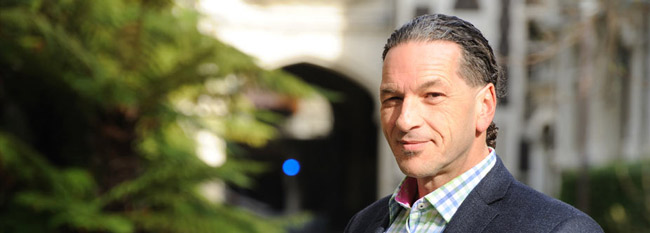
Tuari Potiki.
When the University's Tuari Potiki spoke about the war on drugs to the United Nations General Assembly Special Session in New York, this is what the head of the Office of Māori Development and chairman of the New Zealand Drug Foundation said:
Sometimes, when we are threatened, we go to war. And sometimes, we go to war against the wrong people.
If we decide to wage a war against cancer. Would we do that by bombing the people who have cancer?
Many nations have joined up to wage a war against drugs and have ended up attacking and harming people who really need our help and support.
I started using drugs when I was 13 years old. When I was 28 years old, a judge gave me a choice, to get help for my drug problem or go to jail. That was 27 years ago.
"... because treatment works, I stand here today as Chair of the New Zealand Drug Foundation, as the Director of Maori Development at the University of Otago, and as having not used drugs for 27 years."
I had a judge who could see past my charge sheet, and could see that the reason I was standing in front of him was, ultimately, my drug use. He could see that I needed a health intervention, rather than a criminal justice one, and sent me to treatment for my drug problem.
And because treatment works, I stand here today as Chair of the New Zealand Drug Foundation, as the Director of Maori Development at the University of Otago, and as having not used drugs for 27 years.
My journey was supported by essential harm reduction services, including opioid substitution therapy with methadone. It has also included screening and then treatment for Hepatitis C.
You are here to discuss the world drug problem, but many of you directly contribute to that problem. You deny your citizens access to vital support such as harm reduction, the support that saved my life
You are actively blocking progress towards providing help to those who most need it.
I believe that if you are not a part of the solution then you are a part of the problem, and that the major part of the world drug problem is those countries that continue to block progress towards compassionate, proportionate and health-focused responses to drug use and drug users.
So the first thing I call for in standing before you today is to stop punishing people who are in need of our help. We must stop criminalising people who are in need of our help and support.
I am Kai Tahu, Maori, from Ōtākou, Te Waipounamu/Aoteroa, New Zealand. We are the first people of that land. We have a history of colonisation, dispossession and deprivation, and deprivation has had consequences.
When we focus only on people's drug use, on the problems they present, when we don't ask questions about the wider, broader picture, the why, we can miss so much.
"If there is a war to be fought — and I believe that there is — it should be a war on poverty, on disparity, on dispossession ... "
My problems didn't begin the day I picked up a needle. They went much further back. And this is a story you will hear many, many times, and particularly from indigenous people.
In New Zealand, Maori make up 15% of the population but are 51% of our prison population, and 40% of Maori in prison are in there for drug offences. You see the same pattern in Australian Aboriginals, Native Americans, Native Hawaiians and Alaskans — and indigenous people all over the world — high levels of drug use and drug-related harm. It's no accident.
As indigenous people, we have the solutions to our problems, including our drug problems. In your outcomes document you rightfully acknowledge the importance of the Declaration on the Rights of Indigenous Peoples. But that puts obligations on you to include us in discussions and policy decisions that affect us .And so I ask, that from this UNGASS forward, the unique perspectives and views of indigenous and First Nation's peoples are sought and are included.
If there is a war to be fought — and I believe that there is — it should be a war on poverty, on disparity, on dispossession, on the multitude of political and historical factors that have left — and continue to leave — so many people vulnerable and in jeopardy.
We also need to acknowledge that the people we are here talking about are our sons, our daughters, our brothers, and our sisters. And if you think about how you would want your son or daughter treated if they developed a problem with drugs, then the way forward becomes very clear.
No reira, tena ra koutou katoa (therefore I thank you all)
You can download Tuari Potiki's speech from the United Nations' link here, which expires on May 10.
